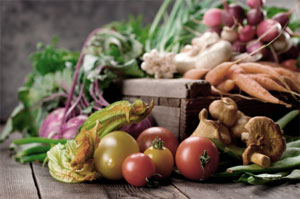Nutrition and Diet
 Now that you have a general idea of Ayurvedic medicine and you know your dosha or
constitution, you are probably curious as to how you can apply this to your life. One of
the most fundamental aspects of Ayurvedic medicine is nutrition and diet and eating the
right foods to heal and prevent illness.
Now that you have a general idea of Ayurvedic medicine and you know your dosha or
constitution, you are probably curious as to how you can apply this to your life. One of
the most fundamental aspects of Ayurvedic medicine is nutrition and diet and eating the
right foods to heal and prevent illness.
Since each personʼs constitution is different, their diet is also going to be different, and
the way they respond to food is different. For example if you are a Pitta type you are
more likely to be aggravated by hot, spicy foods with heating qualities or if you are a
Vaata you are more likely to be aggravated by dry and cold foods. As mentioned earlier
in the first article these food qualities are also the same qualities of the dosha so it
follows the principle that "like increases like", so given that Pitta types have a hot
constitution, foods that are also hot will likely unbalance the Pitta type. Therefore, if
someone with a Pitta constitution is unbalanced or ill they need to follow a cool diet
plan, such as salads. Not only is it important to learn what foods are best for balancing
your constitution, but also what foods are best for aiding in digestion. Our bodies are
fine tuned machines and we want to keep them running optimally, this means reducing
toxin buildup in our systems by eating a "clean" diet. What it means to be "clean" is to
avoid foods that hinder and slow digestion and increase toxin accumulation. For
example, we should avoid fast foods due to many factors, but namely the oils, grease,
and salt content, stay away from stale food, highly processed foods (ie chips, soda, TV
dinners), foods with additives and preservatives, late night eating, and eating in a hurry.
Furthermore, if you go into more detail with Ayurvedic medicine you will find that there
are combinations of foods that should be avoided, you should not eat when emotionally
upset, and also you need to eat small amounts of food. Below you will find some
principles on Ayurvedic eating.
- eat only when hungry; drink only when thirsty
- give yourself adequate time to eat; eat calmly, while sitting
- chew your food well to stimulate digestion
- eat fresh foods; avoid leftovers and stale foods
- eat simpler foods; avoid processed foods and foods with additives and
preservatives
- when you can eat organic
- cooked foods are typically easier to digest, but for some types raw foods can be
appropriate
- make lunch your biggest meal
- donʼt eat late at night
- eat in pleasant surroundings
- focus on the act of eating, donʼt be distracted with other activities like watching
TV
- emphasize foods appropriate for your type
- drink a small amount of warm water with your foods, donʼt drink large quantities
of fluids after a meal as it can disrupt digestion
- donʼt eat fruit or drink fruit juice with a meal
- avoid overeating and stop before you feel full
I am sure in this list you see many points that are similar to what we are taught about
healthy eating and there may be some on the list that were surprising to you, such as
making lunch and not breakfast your biggest meal. What is always most important to
remember is to eat a balanced meal that is minimally processed in order to receive
maximum nutrients to keep our bodies running healthy and to prevent illness. To learn
more about eating an Ayurvedic diet you can read the book Ayuveda Wisdom by Cybele
Tomlinson. She does a great job of describing constitutions and how food, seasons,
tastes, and atmosphere are work together for optimal health.
 Now that you have a general idea of Ayurvedic medicine and you know your dosha or
constitution, you are probably curious as to how you can apply this to your life. One of
the most fundamental aspects of Ayurvedic medicine is nutrition and diet and eating the
right foods to heal and prevent illness.
Now that you have a general idea of Ayurvedic medicine and you know your dosha or
constitution, you are probably curious as to how you can apply this to your life. One of
the most fundamental aspects of Ayurvedic medicine is nutrition and diet and eating the
right foods to heal and prevent illness.